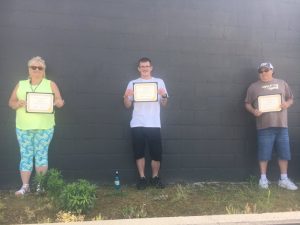News
SES Produces “Virtual Senior Walk” Video in Tribute to DCHS Class of 2020 (VIEW VIDEO HERE)
May 15, 2020
By: Dwayne Page
The Class of 2020 at DeKalb County High School would have graduated tonight (Friday) had the commencement not been postponed due to COVID-19.
The ceremony is now planned for either June 19 or July 17 .
The pandemic also forced a cancellation of another annual event which has become a tradition. A “Senior Walk” in which members of the DCHS Class dress up in their caps and gowns and walk through the halls of their old stomping grounds at Smithville Elementary School and DeKalb West School before they graduate.
Since the Senior Walk could not take place in person this year, the faculty and staff at Smithville Elementary created a “Virtual Senior Walk”. A special video just for the DeKalb County High School Class of 2020.
The video is posted on the SES website and Facebook page and can be viewed by clicking the link below.
https://www.wevideo.com/view/1699148557
“This video was created to celebrate the Class of 2020 at DeKalb County High School. We look forward to our senior walk each year, when seniors return to Smithville Elementary for one last walk through the halls to reminisce, celebrate, and also to inspire our students to strive to achieve great things. We did not want the Class of 2020 to miss out completely on the experience, and we wanted to extend our congratulations to the entire graduating class at DCHS. The faculty and staff at Smithville Elementary are so proud of our seniors, and we hope that this video expresses that pride, and also lets them know how excited we are to see what the future holds for them. Congratulations, and best wishes from Smithville Elementary,” said SES Teacher Beth Cantrell.
Nashville District opening campgrounds, recreation areas in June
May 15, 2020
By:
As part of a phased approach for reopening facilities as part of its COVID-19 reopening plan, the U.S. Army Corps of Engineers Nashville District is opening its corps managed campgrounds on Center Hill Lake and others within the Cumberland River Basin in Tennessee June 1, 2020.
Nashville District’s corps-managed campgrounds in Kentucky will reopen June 11 in alignment with Kentucky’s recently announced “Phase 2” reopening plan. Campground reservations were previously expected to be cancelled through May 31. Individuals with reservations impacted by this closure will have an opportunity to modify their reservation in order to avoid cancellation of dates beyond June 10.The deadline to complete any modifications to reservations is May 25. After that date all reservations will be cancelled and full refunds will be issued.
While these campgrounds and most day use areas will be accessible for visitors to enjoy in June, a return to full operations will continue to be phased and services may be limited. For example, group picnic shelters and developed swimming areas will remain closed at this time. Visitor centers and resource manager’s offices will re-open for limited public access. Issuance of special event permits, special activity permits or letters of permission for small gatherings, as well as small USACE sponsored events to include interpretive programs, public meetings, and other public gatherings, can resume in accordance with federal, state or local guidelines for social gatherings.
“Protecting the health and safety of the recreating public, volunteers, contractors and our personnel remains our highest priority,” said Lt. Col. Sonny B. Avichal, Nashville District commander. “We will continue to assess the situation and will conduct a phased reopening of additional areas/events as state and local guidelines allow social gathering sizes commensurate with the capacity of the amenity or proposed event. We will share those updates with the public as they become available.”
This announcement applies to all Corps-managed campgrounds and recreation areas at Lake Barkley, Lake Cumberland, Laurel River Lake and Martins Fork Lake in Kentucky, and Cheatham Lake, J. Percy Priest Lake, Old Hickory Lake, Cordell Hull Lake, Center Hill Lake and Dale Hollow Lake in Tennessee.
State-operated or concessionaire operated campgrounds at Corps Lakes have their own policies in place. The Nashville District recommends that the public contact the respective state agencies for their operating status.
At the time of this news release, boat ramps as well as parks that were already open or not able to be closed remain open. Restrooms in open areas were opened as needed May 1. Day-use areas will not charge a fee until at least Oct. 1, 2020.
Drive Through Celebration Held for Recovery Court Graduates
May 15, 2020
By: Dwayne Page
A drive through celebration was held Thursday afternoon for five participants of the DeKalb County Recovery Court Program who have graduated and are on the path to sober living.
Each of the graduates, Marina Cornette, Joshua Baxter, Jerry Cantrell, Seth Harris, and Bradley Mullican received a certificate from General Sessions and Juvenile Court Judge Bratten Cook, II in recognition for their accomplishments.
A formal ceremony will be held for them after the COVID-19 pandemic has run its course.
Thursday’s drive through was held in the city parking lot behind the law office of Judge Cook.
Recovery Court, a 12 month program, provides an alternative to incarceration for eligible non-violent offenders, both adults and juveniles, who are deemed substance dependent.
In order to keep tabs on the participants while courts have been closed during COVID-19 , Judge Cook and other members of the team started having Recovery Court outdoors last month.
“This is our 4th Recovery Court drive through for adults and juveniles and it has worked out fabulously. We started the drive through so we could stay in touch with our recovery court participants. Its important for them that we stay in touch and that they stay in touch with us. Actually I think most of them would prefer a drive through rather than coming into court. We enjoy seeing them and they enjoy seeing us. We will keep doing this until we can get the courts opened back up,” said Judge Cook.
In addition to awarding the five graduates Thursday, Judge Cook and the Recovery Court staff checked on several other participants still in the program who were lined up in the drive through while practicing social distancing.
“The judge spoke to each participant who drove through and the team members were also there to speak with them. We checked on them as they went through the line asking questions such as how are you? Is there anything you need? How is your recovery going? What step are you on in the 12 step program? Normal things we would tend to talk with them about except this was a drive through,” said Kate Arnold , DeKalb County Recovery Court Coordinator.
Arnold commended the graduates on their completion of the Recovery Court Program and wished them well.
“This program takes an extreme amount of dedication and hard work, but our hope is that these graduates will take the knowledge and skills that they have learned throughout their time in the program and not only implement it in their life, but to be an inspiration to others,” she said.
« First ‹ Previous 1 1458 1548 1556 1557 15581559 1560 1568 1658 2571 Next › Last »












